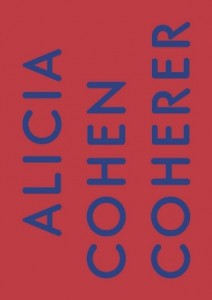Book Review
 Alicia Cohen’s stunning third book of poetry, Coherer, explores the possibilities of writing as an act of creative reading. Presented as an extended meditation on a single stanza from Leslie Scalapino’s extensive body of work (“They are from the glass tubes of the coherer…”), Cohen’s lines often read as surprising and provocative proliferations of this carefully chosen epigraph. She offers a sprawling and rich imaginative topography that rests on this small detail in Scalapino’s fictive landscape as would a city balanced on the head of a pin. In a culture that frequently privileges speaking over listening, Cohen offers a refreshing vision of what poetry can be: an attentive consideration, a recurring site of engagement, and an act of response.
Alicia Cohen’s stunning third book of poetry, Coherer, explores the possibilities of writing as an act of creative reading. Presented as an extended meditation on a single stanza from Leslie Scalapino’s extensive body of work (“They are from the glass tubes of the coherer…”), Cohen’s lines often read as surprising and provocative proliferations of this carefully chosen epigraph. She offers a sprawling and rich imaginative topography that rests on this small detail in Scalapino’s fictive landscape as would a city balanced on the head of a pin. In a culture that frequently privileges speaking over listening, Cohen offers a refreshing vision of what poetry can be: an attentive consideration, a recurring site of engagement, and an act of response.
Cohen’s short poems are especially thought-provoking in this respect. As spare as they are rich in possibility, these small but beautifully rendered fragments prompt the reader to initiate their own imaginative work, to participate in this vision of poetry as conversation and response. The reader is suddenly and provocatively implicated in this redefinition of what is possible as a reader of someone else’s text. She writes in “Spirit”:
this mark’d song
mounts respiration’s
wild reprise
The reader’s work begins the moment they transition from the title to the first line (Does the spirit sing? Or the spirit itself a singing?). As they enter into this three-line poem, they must negotiate the song (which is the spirit) being rendered suddenly material (as it musts be, in order to “mount”) and then, simultaneously immaterial (as it rides the breath or “respiration” of the singer). In the final line, possibility continues to accumulate without any hint of narrative exposition. The reader is encouraged to forge connections, to negotiate competing possibilities within the text, and to enjoy the song without the author having a teleological end in mind. As Cohen enacts this idea of creative reading, she reproduces this relationship between audience and text in the way that her own reader is privileged to interact with the works in this exciting collection.
As both Cohen and her audience engage in creative reading practices, she does necessary work to renegotiate the various power structures inherent in literary criticism. The critic is no longer a detached evaluator, passing judgment on a work of art, but rather, their task is to open up possibilities within that work, to call our attention to details in a sprawling imaginative landscape that we might otherwise overlook. In this sense, Cohen acts as both scholar and practitioner in Coherer, allowing us to see fictive worlds suggested by, though buried within, Scalapino’s original text. The reader, too, is allowed to inhabit Cohen’s role, a gesture that dismantles even more of the hierarchies present within contemporary models of textual engagement. Consider this passage, which appears early in the collection in a poem called “Easter Island”:
bulky aliens
eat all the earth flower
food and shade
our discipline
loves
shape
Here, Cohen explores what it would mean if the logic that governs the original Scalapino quote were to be extended indefinitely. Thus, the poem offers a space for testing questions about the philosophical underpinnings of literary texts, to create imagined topographies in response to the questions, problems, and concerns posed by the work of writers before oneself. Indeed, Cohen takes a fictive world suggested by Scalapino’s text and populates it with “flowers,” “food,” and “shade,” as well as the conventions (or “discipline”) that would govern such a landscape. Like many of the other pieces in Coherer, “Easter Island” offers an elusive and allusive ending, which generates possibilities rather than foreclosing them. The reader is invited to speculate as to the nature of both the “love” and “shape” that are described in the final stanza, with possibilities ranging from the violent to the sublime.
Cohen’s leveling of the hierarchies that we impose upon the various agents within the literary landscape (readers, texts, critics) is compelling, with implications that extend far beyond the many texts that are explicitly named within the book. Not only does Cohen call our attention to the power imbalances inherent in our ways of reading, but she proposes an alternative, a constructive and engaged methodology for thinking through the various literary and cultural works that we encounter. In short, Cohen’s newest book is as thought-provoking as it is theoretically astute. She is certainly a poet to watch.
About the Reviewer
Kristina Marie Darling is the author of over twenty books of poetry. Her awards include two Yaddo residencies, a Hawthornden Castle Fellowship, and a Visiting Artist Fellowship from the American Academy in Rome, as well as grants from the Whiting Foundation and Harvard University's Kittredge Fund. Her poems and essays appear in The Gettysburg Review, New American Writing, The Mid-American Review, The Iowa Review, The Columbia Poetry Review, Verse Daily, and elsewhere. She is currently working toward both a Ph.D. in Literature at S.U.N.Y.-Buffalo and an M.F.A. in Poetry at New York University.